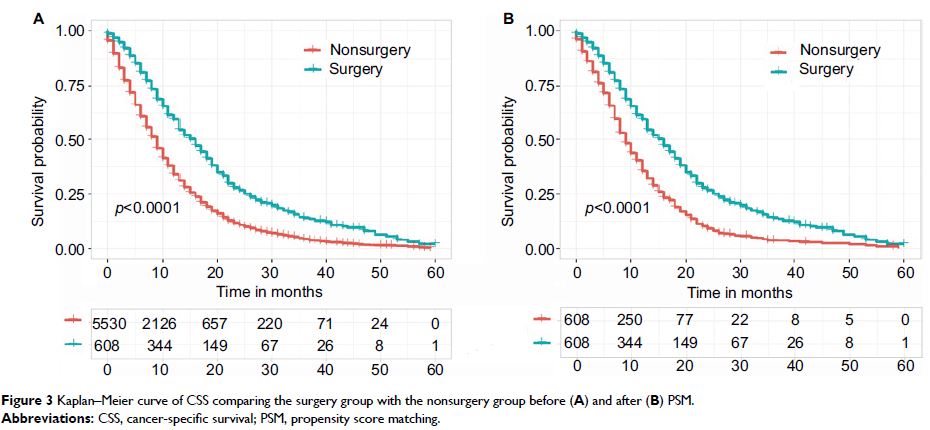9 0 6 7 6
论文已发表
注册即可获取德孚的最新动态
IF 收录期刊
- 2.6 Breast Cancer (Dove Med Press)
- 3.9 Clin Epidemiol
- 3.3 Cancer Manag Res
- 3.9 Infect Drug Resist
- 3.6 Clin Interv Aging
- 4.8 Drug Des Dev Ther
- 2.8 Int J Chronic Obstr
- 8.0 Int J Nanomed
- 2.3 Int J Women's Health
- 3.2 Neuropsych Dis Treat
- 4.0 OncoTargets Ther
- 2.2 Patient Prefer Adher
- 2.8 Ther Clin Risk Manag
- 2.7 J Pain Res
- 3.3 Diabet Metab Synd Ob
- 4.3 Psychol Res Behav Ma
- 3.4 Nat Sci Sleep
- 1.9 Pharmgenomics Pers Med
- 3.5 Risk Manag Healthc Policy
- 4.5 J Inflamm Res
- 2.3 Int J Gen Med
- 4.1 J Hepatocell Carcinoma
- 3.2 J Asthma Allergy
- 2.3 Clin Cosmet Investig Dermatol
- 3.3 J Multidiscip Healthc

在 III 期胰腺癌患者的治疗中加入手术的益处:以倾向调整、人口为基础的 SEER 分析
Authors Wang L, Cheng CS, Chen L, Chen Z
Received 3 March 2018
Accepted for publication 26 April 2018
Published 5 July 2018 Volume 2018:10 Pages 1907—1918
DOI https://doi.org/10.2147/CMAR.S167103
Checked for plagiarism Yes
Review by Single-blind
Peer reviewers approved by Dr Cristina Weinberg
Peer reviewer comments 2
Editor who approved publication: Professor Nakshatri
Purpose: In
the past 20 years, surgical resection has been a secure and applicable
procedure for pancreatic cancer (PC), but it remains controversial for stage
III PC with data evaluating its efficacy mostly derived from small randomized
trials. Hence, we designed this study to further evaluate its benefit using
surveillance, epidemiology, and end results dataset.
Patients and
methods: Patients with stage III PC were
identified in the surveillance, epidemiology, and end results registries from
2004 to 2014. The effect of surgery on cancer-specific survival was assessed by
risk-adjusted Cox proportional hazard regression modeling and propensity score
matching.
Results: Overall, 6,138 patients with stage III PC were included. Of these,
608 patients underwent primary tumor surgery. On multivariable analyses,
surgery was independently associated with improved cancer-specific survival
(HR=0.580; 95% CI=0.523–0.643, p <0.001). The
survival benefit with surgery was also observed in the propensity score-matched
cohort (HR=0.501; 95% CI=0.438–0.573, p <0.001).
Conclusion: Primary tumor surgery is associated with improved survival in
stage III PC. Prospective randomized trials are needed to confirm these
results, and further efforts are required to address patient selection.
Keywords: stage III pancreatic cancer, propensity score matching, surgery,
surveillance, epidemiology, and end results (SEER) database
